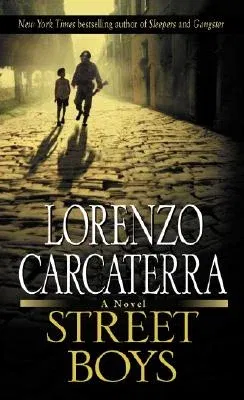Naples, Italy, during four fateful days in the fall of 1943. The only
people left in the shattered, bombed-out city are the lost, abandoned
children whose only goal is to survive another day. None could imagine
that they would become fearless fighters and the unlikeliest heroes of
World War II. They are the warriors immortalized in Street Boys,
Lorenzo Carcaterra's exhilarating new novel, a book that exceeds even
his bestselling Sleepers as a riveting reading experience.
It's late September. The war in Europe is almost won. Italy is
leaderless, Mussolini already arrested by anti-Fascists. The German army
has evacuated the city of Naples. Adults, even entire families, have
been marched off to work camps or simply sent off to their deaths. Now,
the German army is moving toward Naples to finish the job. Their
chilling instructions are: If the city can't belong to Hitler, it will
belong to no one.
No one but children. Children who have been orphaned or hidden by
parents in a last, defiant gesture against the Nazis. Children, some as
young as ten years old, armed with just a handful of guns, unexploded
bombs, and their own ingenuity. Children who are determined to take on
the advancing enemy and save the city--or die trying.
There is Vincenzo Soldari, a sixteen-year-old history buff who is
determined to make history by leading others with courage and
self-confidence; Carlo Maldini, a middle-aged drunkard desperate to
redeem himself by adding his experience to the raw exuberance of the
young fighters; Nunzia Maldini, his nineteen-year-old daughter, who
helps her father regain his self-respect-- and loses her heart to an
American G.I.; Corporal Steve Connors, a soldier sent out on
reconnaissance, then cut off from his comrades--with no choice but to
aid the street boys; Colonel Rudolph Van Klaus, the proud Nazi commander
shamed by his own sadistic mission; and, of course, the dozens of young
boys who use their few skills and great heart to try to save their city,
their country, and themselves.
In its compassionate portrait of the rootless young, and its pitiless
portrayal of the violence that is at once their world and their way out,
Street Boys continues and deepens Lorenzo Carcaterra's trademark
themes. In its awesome scope and pure page-turning excitement, it stands
as a stirring tribute to the underdog in us all--and as a singular
addition to the novels about World War II.

